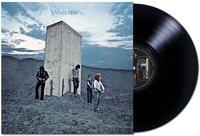The Who - Who's Next
(Remastered )
| Label: |
Geffen |
| Genre: |
Pop/Rock |
| Product No.: |
AGEF 3585840
|
| UPC: | 602435858401 |
| Availability: |
In Stock
|
| Category: |
180 Gram Vinyl Record |
Also available on:
• 180 Gram Vinyl Record
• 180 Gram Vinyl Record
Remastered Half-Speed Master
• Vinyl Box Sets
+ San Francisco 1971 - Limited Edition 4 LP Box Set
• Multi-Format Box Sets
+Life House - Super Deluxe Edition 10 x CD + Blu-Ray + Hardback Book + Graphic Novel + Posters, + Concert Programs + Buttons + Band Photo with Printed Autographs
180-gram vinyl
Remastered by Jon Astley at Close to the Edge from the original tapes
Rolling Stone 500 Greatest Albums of All Time — rated 77/500!
Remastered version of the album, housed in the original jacket with a printed sleeve and pressed on 180-gram black vinyl.
Who's Next is the fifth studio album by The Who, originally released in 1971. The album has its roots in the Lifehouse project, a science fiction rock opera intended as a follow-up to Tommy. The ambitious, complex project did not come to fruition at the time and instead, many of the songs written for the project were compiled onto Who's Next. The album features the singles "Baba O'Riley", "Behind Blue Eyes" and "Won't Get Fooled Again," making it one of The Who's most critical as well as commercially successful records.
Lifehouse was Pete Townshend's futuristic fable that would transcend itself beyond the usual conventions of modern music. Intended to be a film, a play, a concert, a mega multimedia and cerebral experience — how Townshend's ambitious follow-up ended up as Who's Next is complicated.
Several false starts and a break with Who manager/mentor, Kit Lambert resulted in the record being eventually rescued and shaped by producer/engineer, Glyn Johns. Much of Townshend's vision was contained within his extensive demos — bits and pieces of a loosely constructed storyline set against experimental melodies and basic backbeats. The album's opening track, "Baba O'Riley," was originally an elongated cycle of synthesizer loops. What it became was an anthem, highlighted by a tumultuous build, Dave Arbus' rambling violin and Roger Daltrey's acclamation of a "Teenage Wasteland."
"I like synthesizers," Townshend said, "because they bring into my hands things that aren't in my hands: the sound of the orchestra, French horns, strings.... You press a switch and it plays it back at double speed."
The thunder is sustained by the contagious "Bargain" — now, like so much of the Who's music, a commercial jingle. "Love Ain't for Keeping" chugs away against a fierce acoustic rhythm while John Entwistle's sole contribution of "My Wife" remains one of his most electrifying songs. "This Song Is Over" features Nicky Hopkins' incomparable piano work and ends with a chorus pulled from "Pure and Easy," the central number of Lifehouse that failed to make the final cut, but would resurface three years later on the Odds And Sods compilation. The theme is maintained on "Getting in Tune," reintroduced during the Who's most recent tour, and "Going Mobile," a track with Townshend on lead vocals that recounts a couple of Lifehouse's characters cruising the streets in a Cadillac.
| Side A | Baba O'Riley | Bargain | Love Ain't for Keeping | My Wife | The Song Is Over | Side B | Getting in Tune | Going Mobile | Behind Blue Eyes | Won't Get Fooled Again |
|
View other items by The Who |
|
 In-Stock Music Orders Over $99 SHIP FREE Within The Continental U.S.
In-Stock Music Orders Over $99 SHIP FREE Within The Continental U.S.







 Login
Login
 My Account
My Account
 Cart
Cart Wishlist
Wishlist
 Contact
Contact





